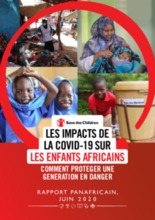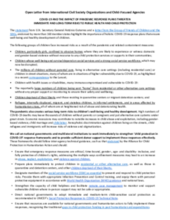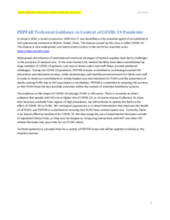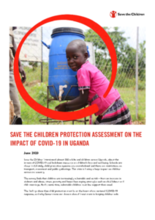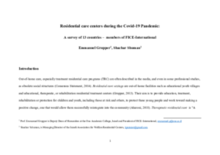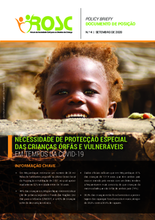This section includes resources on the response to the COVID-19 pandemic as it relates to child protection and children's care.
News on COVID-19 and Children's Care
Webinars and Events on COVID-19 Response
Displaying 341 - 350 of 756
This policy paper by Save the Children outlines some of the main threats the COVID-19 pandemic poses to children in Africa and suggests some of the political and programmatic responses to protect children’s rights.
Ce rapport souligne que, bien que les enfants ne représentent pas un groupe à haut risque en terme de mortalité directe due à la COVID-19, la pandémie a des impacts secondaires de grande envergure qui augmentent les risques pour les droits et le bien-être des enfants africains.
In this episode of the Protected! Podcast, Hani Mansourian from the Alliance for Child Protection in Humanitarian Action talks to Selim Benaissa, Chief Technical Officer from the ILO on the Myanmar program for the elimination of child labour about how the coronavirus pandemic has affected the program.
In this comment from the Lancet, the authors explores how to communication to children about the COVID-19 pandemic, particularly when someone in the family is hospitalised for or dies from COVID-19.
This open letter calls on national governments and multilateral institutions to work immediately to strengthen ‘child protection in COVID-19’ response frameworks and to provide sufficient donor support to implement these responses effectively.
This document provides technical guidance for a variety of PEPFAR issues, including the care of orphans and vulnerable children (OVC), and will be updated routinely as the situation evolves.
A coalition of six disability rights organisations has launched a major international monitoring initiative entitled “COVID-19 Disability Rights Monitor” to conduct rapid independent monitoring of state measures concerning persons with disabilities.
This report finds that children in Uganda are increasingly vulnerable and at risk from an in crease in violence and abuse, stress, poverty, and hazardous coping strategies such as child labour and child marriage during the COVID-19 pandemic. At the same time, vulnerable children have less support than usual.
FICE Israel decided to initiate a short survey to document and share information about the way different countries handled their policies and practices in residential care facilities during that period. This report presents findings and some conclusions from this primary survey.
Nos finais de 2019, a China presenciou uma onda de mortes devido a eclosão do novo coronavírus, tendo-se alastrado para outros países no início de 2020 incluindo Moçambique, o que levou a Organização Mundial da Saúde (OMS) a declará-lo pandemia mu


